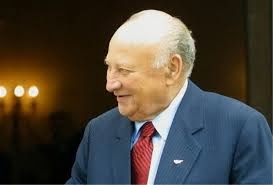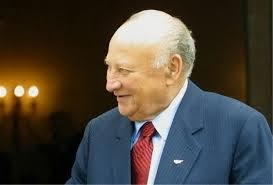By Zina Lysandros Panagidis,
Philologist, MSc:
"Going against the flow of time has a cost, but if you want to be a leader, you have to guide the people and not be guided by the current. If you do that, then you are not a leader, you are just a politician. ". Glafkos Clerides
These words that I read in an interview of the former President, blessed Glafkos Clerides, in ef. "O Phileleftheros", to the journalist Antigoni Solomonidou Drousiotou, reminded me of Thucydides who at 2.65, in the XNUMXnd Chapter of the work of "Thucydides Stories", evaluates the policy of Pericles and sketches his personality, ie knits in the following words:
2.65.8 {}
αἴτιον δ 'ἦν ὅτι ἐκεῖνος
μὲν δυνατὸς ὢν τῷ τε ἀξιώματι καὶ τῇ γνώμῃ χρημάτων
τε διαφανῶς ἀδωρότατος γενόμενος κατεῖχε τὸ πλῆθος ἐλευ-
θέρως, καὶ οὐκ ἤγετο μᾶλλον ὑπ 'αὐτοῦ ἢ αὐτὸς ἦγε, διὰ τὸ
μὴ κτώμενος ἐξ οὐ προσηκόντων τὴν δύναμιν πρὸς ἡδονήν τι
λέγειν, ἀλλ 'ἔχων ἐπ' ἀξιώσει καὶ πρὸς ὀργήν τι ἀντειπεῖν.
How it fits our late President!
Translated by Eleftherios Venizelos, the words of Thucydides say the following:
"The reason for this was that Pericles, having a great influence, stemmed from his common appreciation and personal ability, and he clearly emerged as the highest degree of money, he restrains the people, although respecting his freedoms, he too was led by him. As long as he does not seek to gain influence through illegitimate means, he does not speak to flattery, but, based on the common appreciation towards him, is able to oppose them, provoking their anger if necessary ".
Venizelos' cleanser, I think, is very clear. All the points fit perfectly with the personality of our respected Glafkos Clerides. I will dwell on three points:
a) "Transparent most generously made", with transparency, clearly, as it is known to all, obviously, was never bribed. His honesty, integrity and selflessness are proverbial. He was superior to money. What do we need witnesses for that? Is undeniable!
b) "and he was not leading under him or he was leading", he was leading the people, rather than being carried away by the people. At critical moments, as a leader, he stepped forward and boldly and openly expressed his views to the people, even if they did not like it. He was never a demagogue and did not caress anyone's ears. He only regretted that he did not speak clearly to the people in 1973, when they had almost reached an agreement with Denktash.
We read again in the same interview:
"My biggest mistake is when I did not speak publicly in 1973 when we were on the verge of a much better solution than Zurich.
Many times I asked myself why I did not do it, maybe because I was afraid to clash with Makarios. And on the other hand it was Grivas, maybe I was afraid I might be squeezed between the two. "I do not know why I did not do it either."
c) "ἀλλ 'ἔχων ἐπ' ἀξιώσει καὶ πρὸς ὀργήν τι ἀντειπεῖν". He could, therefore, because of the appreciation that the people had for him, oppose the people and provoke their anger. The facts are still fresh, and need no mention.
I would also like to mention what Thucydides says about the successors of Pericles:
[2.65.10]
οἱ δὲ ὕστερον ἴσοι μᾶλλον αὐτοὶ πρὸς ἀλλήλους ὄντες καὶ
ὀρεγόμενοι τοῦ πρῶτος ἕκαστος γίγνεσθαι ἐτράποντο καθ '
ἡδονὰς τῷ δήμῳ καὶ τὰ πράγματα ἐνδιδόναι.
Venizelos' translation again:
"While his successors were probably equal to each other, but each seeking to be first, they were ready to sacrifice this direction of public affairs to the respective appetites of the crowd."
Selectively, President Clerides left a legacy to his descendants and to all of us. It is up to us to follow his example, to honor his values and to respect his memory!
May God rest his soul!

